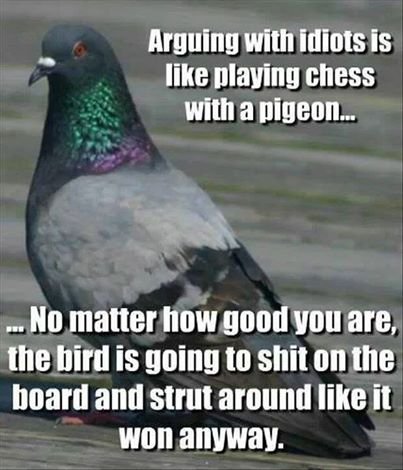
Calm yourself - picture from Know Your Meme
Political Blood Sports
The way I see it, there are two approaches to discussing politics. The first, and most common is what you could refer to as Political Blood Sports and it is the kind of political discussion you most often see duked out on social media, during family gatherings when your loud uncle has had one too many beers and, sadly but understandably, among professional politicians. Political bloodsports has one goal and one goal only: To separate the participants into winners and losers. The tools involved in order to achieve this can vary depending on the level of decorum of the participants and can be anything from attacking the philosophical foundations of your opponents’ principles and/or the negative consequences of suggested practical implications of those principles to having no arguments at all and just resorting to character assassination and name calling. While the political blood sports format certainly can be entertaining and occasionally change minds and lead to productive changes, it is also responsible for ~ 90 percent of all horrible comments on any social media platform, and most people who has been involved in such discussions would probably argue that they are unproductive at best and destroyers of friendships and family relations at worst.

Often what Political Blood Sports boils down to - picture from The Memes Factory
If it is not clear already, I am not a fan of this way of debating. Although the younger me did spend a significant portion of his day getting riled up over debates on the internet, I did at some point realize that it did nothing good for my mood and have (mostly) retired from internet debating altogether. As such, political blood sports is not what I will discuss here.
The Debate in Good Faith
What I do want to discuss is an entirely different and much rarer form of political debate, where the purpose is actually exploring and discussing the political principles of your opponent in good faith. I call this (not surprisingly) The Debate in Good Faith. In political blood sports, arguing in bad faith, either strategically or simply out of malice, is an easy position to take because of the underlying premise of the format, but it means that you will seek only to demonize rather than understand your opponent’s ideas and premises. Adopting the Socratic Method while actually listening to and asking honest questions in good faith about your opponent’s propositions will not only help you understand your opponent’s positions better and make you better equipped to make value judgments about them, but in turn will also test the strength and validity of your own arguments and principles. As implied in the above, the success of the Debate in Good Faith rests on the premise that both you and your opponent are actually willing to learn about each other's positions and not just seek to subdue the other.
Biases
While not strictly necessary, it is advisable to take the position of openness from the Debate of Good Faith to its logical and honest extreme, which is that you are also actually willing to revise your position if presented with sufficient evidence of the superiority of a competing position, but this can be a hard and sometimes viscerally unpleasant thing to do, especially when concerning your principles, which acts as governing political assumptions and the cornerstone upon your whole political understanding rests. Because of how fundamental these principles are to our person, we often have an emotional attachment to them, which can be described as our political bias. Everyone is politically biased in one way of another (and anyone who tells you otherwise is lying) but do not let that fact discourage discussion – the barriers to a good discussion that your biases can manifest as can be mostly mitigated by being aware of your biases and over time, given an open mind and sufficient arguments, biases can change.

Picture from Uplift Connect
Limits To Open Debate
One of the fundamental differences between Political Blood Sports and The Debate in Good Faith is the question of whether or not to view your opponent as a person worth debating. A perfectly legitimate follow-up question to this would of course be if there are limits to what kind of opinions you can debate in good faith. Said in another way, are there opinions and principles that are simply beyond the pale and are some people simply, well, assholes? Where to draw the line is ultimately up to the individual, because principles and opinions fall on such a wide spectrum. I will, however, say this: If your underlying premise is that debating is not about winning and losing, but about getting wiser, even individuals, who holds beliefs that are almost universally hated such as Nazis or members of ISIS, can be worth your time, if nothing else to understand their motivations and gain more knowledge about their beliefs. After all, how can you make an honest value judgment about their beliefs if you do not truly know what they are? If you truly consider people, who hold such beliefs your enemy, would you not be better off knowing more about what drives them? Extremists are usually fanatics and trying to convince them to have an open debate in good faith or change their tune will most likely be a fruitless endeavor, but always remember that occasionally even the most fanatic person have been swayed by a person, who with patience and good intentions showed them the error of their ways.
So how do I win?
If I have not made it clear in the above, the goal of the Debate in Good Faith is not to win, but to become wiser about both your own and your opponent’s thoughts, opinions and principles. You have won when you walk away from a productive debate and the knowledge you have gained is your spoils of victory. I wish you the best of luck, and good debating!

Image from iidebate
Thank you for reading! If you like this post, leave an upvote and a comment and please check out my other content on political and historical issues: World War I, The Link Between Libertarianism and the Alt-Right and The Republic of San Marino. Also check out iidebate's handy mini guide to being a good debater
People are very fond of dropping hot takes, these days and are not really interested to listen. I think the art of debating in good faith is SO RARE that it might be a super power!
Nice article, @cogitecture :) Always lovely to read your well-written posts * ___ *
Downvoting a post can decrease pending rewards and make it less visible. Common reasons:
Submit
Thank you, @veryspider! Yes, hearing each other out and actually having a civilized discussion have become a rarity these days :(
Downvoting a post can decrease pending rewards and make it less visible. Common reasons:
Submit